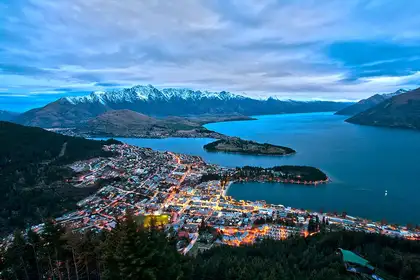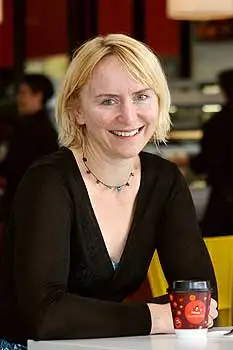
Top tourism destination Queenstown has been under pressure with demands for affordable accommodation for tourism workers (image/Wikimedia Commons).
Environmental and social impacts of tourism – from freedom campers to overcrowded national park trails and accommodation shortages in Queenstown – must be balanced with benefits says the convener of a conference on sustainable tourism.
Professor Regina Scheyvens, who heads the Development Studies programme at Massey, has initiated the world’s first Tourism and the Sustainable Development Goals conference 2019 (January 24-25). The conference will bring academics and industry representatives together to discuss tourism within the framework of the United Nations' Sustainable Development Goals (SDGs).
“Tourism’s fantastic. We love it, until we get too much of it - then we hate it,” Professor Scheyvens says. “It provides money and jobs – but suddenly our little coastal towns get crowded and we start getting worried about some of the social and environmental problems.
“New Zealand has been able to trade for a long time on our clean green image, and friendly people. But the welcome to visitors does start declining when locals feel they are bearing too much of the negative impact,” she says. “We’ve seen this in the last two European summers with anti-tourism protests in places such as Barcelona.”
The backlash against tourism in popular European cities of Spain, Italy, Portugal and Croatia, is the result of residents saying things are getting too over-crowded, pushing up the cost of rents. “Airbnb people get up early to catch flights and pull their trolley cases over cobblestones and wake everyone up at 5am. Residents sometimes can’t afford to live in their inner cities anymore, and their parks become over-run with tourists leaving little space for local children,” Professor Scheyvens says. Closer to home, thousands were recently turned away from Australia’s iconic Hyams Beach – said to have some of the world’s whitest sand – because heavy traffic was turning the quiet haven into a nightmare.

Professor Regina Scheyvens.
Tourism priorities for NZ?
Professor Scheyvens believes New Zealand has to learn from these situations and encourage quality tourism by developing more conservation-oriented and authentic cultural and indigenous experiences. “We do it better than a lot of other countries – we didn’t used to but thanks to more Māori ownership of tourism products – such as Footprints Waipoua [night time forest tours to see ancient kauri, Tane Mahutu] and Kapiti Island Nature Tours – things are changing.”
In New Zealand, the priorities are how we manage our natural resources, says Professor Scheyvens, who thinks not enough money is spent on conservation.
Concerns for homegrown tourism include freedom campers and how we cater to their needs. “We hear about people in Taranaki who can’t park at their favourite beaches due to the number of freedom campers, or about the state of public toilets freedom campers make use of, with local councils having to bear costs of providing extra facilities but not reaping the rewards of tourism.
“These are difficult things to manage and SDGs [Sustainable Development Goals] talk about the importance of working in partnership so we hear everyone’s voices and find a balanced approach.”
What are the Sustainable Development Goals?
In 2015, 190 countries adopted the United Nation’s 2030 Agenda for Sustainable Development and its 17 Sustainable Development Goals, which include; no poverty, zero hunger, good health and wellbeing, quality education, gender equality, clean water and sanitation, decent work and economic growth, sustainable cities and communities, climate action and responsible production and consumption.
Professor Scheyvens says the goals can provide guidelines to bring together diverse interests, issues and stakeholders in the tourism sector. “I’m optimistic there is opportunity for some traction [for the SDGs] in that the tourism industry relies on natural beauty and a friendly welcome to bring people to destinations. If we want to continue to have that, tourism businesses have to think through things like their waste management practices or the use plastic packaging, and also treat their employees well and ensure there are local benefits.”
The goals address issues such as ‘decent work for all’, which would mean paying employees a living wage, offering training and progression opportunities, and more secure contracts. A greater awareness of the SDGs also means tourists have a role to play in querying sustainable, ethical practices, she says. “Research is showing more tourists support ethical tours, and putting back into the communities they visit – but they often have a limited understanding of what that means.”
Asking questions – like, “Does the hotel minimise food waste?” and “In what ways do they conserve water and energy?” – can make a difference, she says. “Once a few people ask, hotels may change the way they do things. Often, the higher up the luxury ladder, the more waste is created.”
An expert in South Pacific tourism development, Professor Scheyvens will join 80 other speakers at the conference. While the conference takes a critical approach, she says, “We’re also looking for positive ways of moving ahead so everyone can take away ideas on how to do things more effectively. We want to learn from research about good practices that are already in place, as well as how we get more radical change where it’s needed so that people can see it is possible to make changes and still have successful tourism. But we can’t just go on with a business as usual approach – that’s not going to work.”
Scholars, non-government and government officials as well as tourism industry representatives from the South Pacific, Europe, the Middle East, North America and Africa, will attend the conference at Massey’s Auckland campus, in Albany.
Keynote speakers include:
Professor Suzanne Becken, Director of the Griffith Institute for Tourism, Griffith University, Queensland. She specialises in sustainable tourism with a focus on resource use, climate change, and environmental monitoring. She founded the Global Sustainable Tourism Dashboard – the only global tool to track tourism’s contribution to the SDGs.
Professor Michael Hall, Department of Management, Marketing and Entrepreneurship, University of Canterbury. His research interests are in tourism and temporary mobility, regional development, environmental history, global environmental and climate change, sustainability and wine and food.
Johnny Edmonds, (Ngāpuhi), Director for the World Indigenous Tourism Alliance (WINTA), a global Indigenous organisation established in 2012 by national Indigenous tourism organisations operating in Australia, Canada, Nepal, New Zealand, Sweden and USA.
For more details on the conference and keynote speakers go to: https://tourism-sdg.nz
Follow on Facebook and Twitter: @Tourism4SDGs